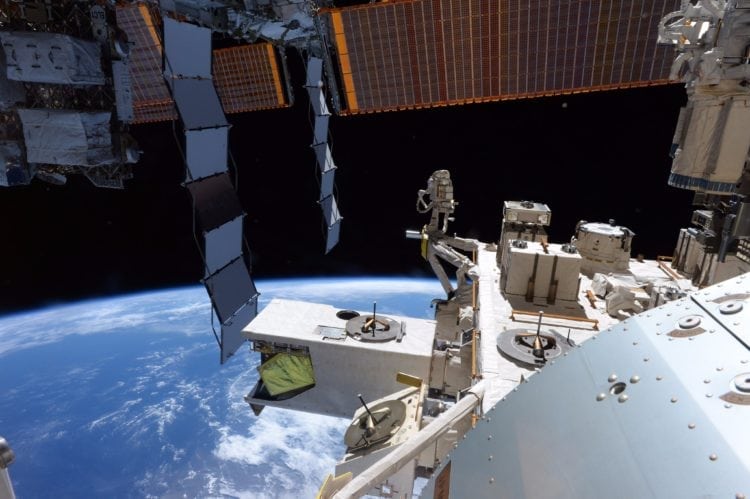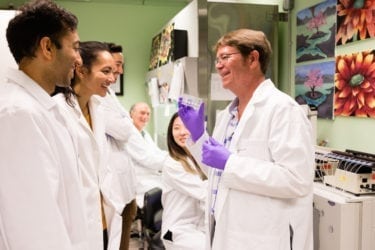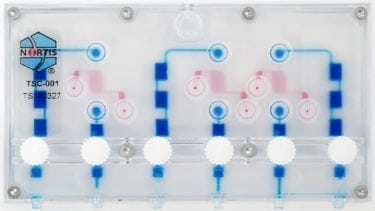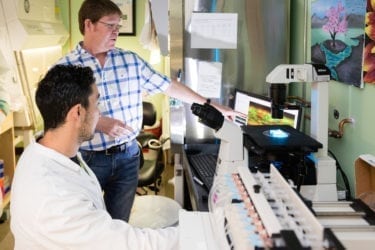
UW Pharmacy and UW Medicine team to study how weightlessness accelerates kidney damage
In 2019, a rocket carrying a payload that includes 24 microfluidic chips about the size of credit cards will transport an extraordinary University of Washington kidney research project to the International Space Station.

University of Washington School of Pharmacy and UW Medicine researchers, in collaboration with the Seattle-based organ-on-a-chip company, Nortis, have been developing the “kidney-on-a chip” as a laboratory model for understanding how this organ is affected by drugs, toxins and environmental exposures. The chips contain a central chamber lined with live kidney cells.
This novel space medicine project is an attempt to understand how microgravity and other factors worsen kidney health. Researchers hope to use these discoveries to design better treatments for proteinuria (the presence of protein in the urine that signals possible kidney problems), osteoporosis (bone loss) and kidney stones on Earth.
“Weightlessness is an accelerator,” said UW School of Pharmacy faculty member and Kidney Research Institute investigator Ed Kelly. “In the microgravity environment on the International Space Station, kidney problems are more common and develop in weeks or months, instead of decades. By studying the kidney on a chip after a few weeks in space, we expect to learn more about how osteoporosis, kidney stones and other kidney conditions develop, which may lead to breakthroughs in treatment and prevention.”
The first phase of the project will be to launch chips that measure the effect weightlessness has on healthy kidney cells. The second phase will launch about 18 months later and will measure the effect of weightlessness on diseased kidney cells. Astronauts on the space station will monitor and maintain the chips and then return them to Earth after several weeks for the UW team to examine.

Jonathan Himmelfarb, of UW Medicine and director of the Kidney Research Institute, a collaboration between Northwest Kidney Centers and UW Medicine, along with researchers from the UW School of Pharmacy: Ken Thummel, Ed Kelly, and Cathy Yeung, have developed the kidney-on-a-chip system using technology developed by Nortis. The kidney chips contain a small sample of live human kidney cells to test how drugs will affect those cells. The system offers a safer, more accurate, less invasive means of testing drugs before they are tried in patients. Importantly, it will reduce the need for animal testing in drug discovery research.
“Use of the human kidney on a chip here on Earth has already taught us a lot about kidney function and kidney diseases,” said Himmelfarb. “The opportunity to study how physical cues emanating from loss of gravitational forces affect kidney cellular function has the potential to improve the health of people living on Earth as well as prevent medical complications that astronauts experience from weightlessness.”
The kidney is a critical organ in drug clearance. When healthy, your two kidneys work together to filter about 110 to 140 liters of blood and produce about 1 to 2 liters of urine every day. Dehydration or diseases like diabetes and high blood pressure impair kidney function and result in serious medical conditions including protein in the urine and kidney stones. The kidney also plays a critical role in the body’s ability to use Vitamin D to maintain strong bones; a decline in this function can result in a loss of bone health.

A better understanding of the mechanics of basic kidney function could lead to improved treatments for patients fighting kidney conditions. Pharmaceutical scientists from the UW School of Pharmacy have significant knowledge on how drugs affect and are processed by the body. Their work in this area enhances the research done by UW Medicine and Kidney Research Institute clinicians.
The Kidney on a Chip in Space Project will study effects of microgravity on the structure and function of the proximal and distal tubule microphysiological system. This model is used in laboratory studies to understand how the kidney clears drugs and how medications damage the kidney. In people, the kidney proximal and distal tubules are located in the nephron, which is the basic functional part of the kidney. They are both convoluted, but have different structures. The new chip project extends previous work on modeling a proximal tubule by adding a distal tubule.
The UW School of Pharmacy, UW Medicine and Kidney Research Institute team have partnered with BioServe Space Technologies at the University of Colorado to work with engineers who specialize in developing scientific testing equipment for space launch. The four-year, $3 million grant (1 UG3 TR002178-01) was awarded by National Center for Advancing Translational Sciences (NCATS), part of the National Institutes of Health (NIH). The Center for the Advancement of Science in Space (CASIS), the organization tasked by NASA to manage the International Space Station U.S. National Laboratory, will contribute the space flight, time in station, and Space Station crew costs, for an in-kind total of $8 million.
The official project kick off will be in late September at Cape Canaveral in Florida.
# # #
About UW School of Pharmacy: UWSOP is comprised of three departments: Medicinal Chemistry, Pharmaceutics, and Pharmacy, offering Ph.D., M.S., and PharmD degrees, post docs and certificate programs. The UW School of Pharmacy is a global leader in pharmacy education, research and service, committed to providing a transformative learning experience in a collaborative and diverse environment focused on improving the health and well-being of the communities we serve.
About UW Medicine: UW Medicine is one of the top-rated academic medical systems in the world. With a mission to improve the health of the public, UW Medicine educates the next generation of physicians and scientists, leads one of the world’s largest and most comprehensive medical research programs, and provides outstanding care to patients from across the globe. UW Medicine’s four hospitals – Harborview Medical Center, Northwest Hospital & Medical Center, University of WashingtonMedical Center and Valley Medical Center – admit more than 63,000 patients each year. A network of hospital-based and outpatient clinics, including 12 UW Neighborhood Clinics, provides care for more than 1.3 million patients each year. For more information, visit uwmedicine.org.
About the Kidney Research Institute: The Kidney Research Institute supports the prevention, early detection and treatment of kidney disease and its complications. Founded in 2008 by Northwest Kidney Centers and UW Medicine, its mission is to conduct research that can improve the lives of those with kidney disease. Based at Harborview Medical Center in Seattle, the Kidney Research Institute uses findings from patient treatments to inform scientific investigations in the lab, and vice versa. Find out more at kri.washington.edu.
About Nortis: Nortis, Inc. is a company developing organ-on-chip technologies as alternatives for animal testing in academic research, pharmaceutical industry, environmental health and safety, and other areas. Nortis partners with leading researchers world wide to develop living models of human organs, like the kidney, in microfluidic chips that better predict outcome in humans.
About CASIS: The Center for Advancement of Science in Space (CASIS) is the non-profit organization selected to manage the ISS National Laboratory with a focus on enabling a new era of space research to improve life on Earth. In this innovative role, CASIS promotes and brokers a diverse range of research in life sciences, physical sciences, remote sensing, technology development, and education. Since 2011, the ISS National Lab portfolio has included hundreds of novel research projects spanning multiple scientific disciplines, all with the intention of benefitting life on Earth. Working together with NASA, CASIS aims to advance the nation’s leadership in commercial space, pursue groundbreaking science not possible on Earth, and leverage the space station to inspire the next generation.
About the ISS National Laboratory: In 2005, Congress designated the U.S. portion of the International Space Station as the nation’s newest national laboratory to maximize its use for improving life on Earth, promoting collaboration among diverse users, and advancing STEM education. This unique laboratory environment is available for use by other U.S. government agencies and by academic and private institutions, providing access to the permanent microgravity setting, vantage point in low Earth orbit, and varied environments of space.
# # #
To study with researchers like Drs. Kelly and Yeung, click on the links for more information about our Graduate Programs in Medicinal Chemistry, Pharmaceutics, Pharmaceutical Outcomes Research and Policy, and Biomedical Regulatory Affairs.